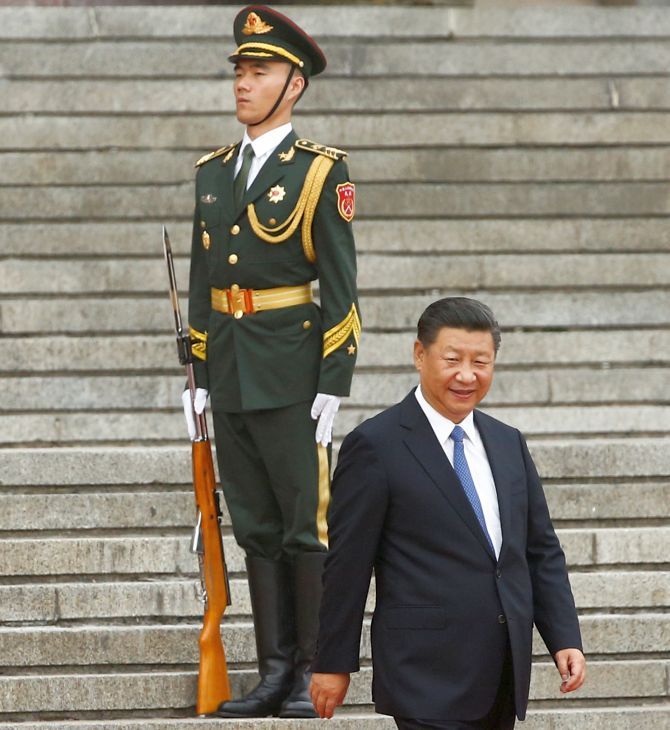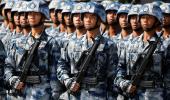China's leader will display his grip on the Communist party and chart his plans for his country's future, observes Claude Smadja.

This is the high noon of politics in Beijing, with the preparations in top gear for the 19th Congress of the Chinese Communist Party coming up next Wednesday.
This congress promises to be a seminal event not only for China's future, but also for global politics and economics: The implications of what will emerge from the congress will extend far beyond China's borders.
Three key outcomes are expected from the congress: The mapping out of China's strategic goals at the domestic and the international levels over the next five years; an indication on the extent to which President Xi Jinping has further strengthened his grip on power; significant clues about the new architecture of power in Beijing and whether Xi is planning to extend his role after 2022, and if so, how.
In that respect, according to the present party rules, five out of seven members of the politburo standing committee should be replaced, along with 11 of the 25 members of the politburo.
One clue: If one or two new appointees to the politburo are in their mid-fifties this would put them in the right age bracket to be potential heirs to Xi after 2022.
The question then will be whether the roles of head of State and secretary general of the party will be split -- with Xi possibly retaining the party job.
The crescendo at which the Chinese leader has consolidated his power over the past five years has been remarkable.
His ruthless anti-corruption campaign has allowed him to eliminate all potential centres of competing power around retired leaders Jiang Zemin and Hu Jintao, in the Youth League and in the military.
He has established a tight grip on all the key 'leading small groups' -- the committees that set policy orientations in domains from foreign policy to anti-corruption or national security or economic and financial policies.
He then made the Communist party bestow on him the title of 'core leader', giving him a special stature above all leadership members -- in direct line with Mao Zedong, Deng Xiaoping, and Jiang Zemin.
Last July, Xi ensured the elimination of the Chongqing party chief, Sun Zhengcai, who was seen as a potential next president and is now accused of corruption. Sun has been replaced by Chen Miner, a rising political star close to Xi.
The Chinese leader then highlighted his sole control and authority on the military by presiding alone, in military fatigues, the huge parade and ceremonies for the 90th anniversary of the foundation of the People's Liberation Army, a military that he is restructuring and streamlining into an efficient 21st century fighting force capable of projecting Chinese power.
As the stage is set for the 19th Congress, Xi's actions have to be seen in light of the three objectives he is aiming to achieve during his tenure of power.
The first is to ensure the long-term maintenance and sustainability of the Communist party power.
Xi has followed upon the assessment of his predecessor Hu that corruption is the greatest threat to the survival of the regime and has launched a ruthless anti-corruption campaign with the twin benefit of getting rid of political rivals while improving his and the party's public image.
However, other challenges are looming ahead as the Chinese society becomes ever more complex, with diversified interests and increasing sophistication.
Will the people continue to be satisfied with an extension of their sphere of personal autonomy that remains subject to the whims of the party?
How will the new generation -- and the next -- accommodate itself with a number of constraints that limit the activities of the private sector, and the overwhelming reach of Big Brother watching permanently over their shoulder?
How will the regime maintain a control on the key sectors of the economy through State-owned enterprises while needing the entrepreneurship of the private sector, which is the main source of jobs creation?
And, above all, will the regime continue to be able to deliver the ever higher standards of living from which it derives its legitimacy?
This rests on the success of the difficult restructuring and transformation of the present economy -- with all its imbalances and distortions -- into a knowledge-based, technology-driven economy with domestic consumption as its main engine of growth.
Which leads to Xi's second objective: To be the leader who will have steered China into becoming a 'moderately well-off society by 2021' -- which means the doubling of the country's GDP between 2010 and 2020.
To that aim, the leadership is taking the risk to keep increasing the level of the national debt from 235 per cent of GDP to close to 300 per cent by 2022, according to the International Monetary Fund, which noted recently that 'China's credit growth is on a dangerous trajectory'.
The leadership's answer to this challenge has been the launch of the 'Made in China 2025' initiative that aims to boost innovation and technological capabilities in 10 key sectors of the economy of the 21st century, such as automated machine tools and robotics; aerospace and aeronautical equipment; new-energy vehicles; new materials.
The goal is to raise domestic content in these sectors -- now between zero and 25 percent depending on the sector -- to 70 per cent by 2025.
This may put China on a collision course with the US and Europe as its will tend to eliminate US and European corporations operating in China from sectors where Chinese companies will benefit from large government support to achieve this objective.
The third objective of Xi is to install 'a new model of relations between great powers' -- simply put, setting China on a par with the US.
Beijing does not necessarily want to supplant the role of the US -- except in Asia -- but intends from now on to deal with Washington on an equal footing.
The success of this strategy rests on continuing to build the country's power projection capabilities, on asserting China's role and claims in the South China Sea and on the success of the One Belt, One Road initiative -- the ancient Silk Road complemented by a maritime one -- with the aim of building a sphere of co-prosperity with China as its hub and creating a sphere of geopolitical influence.
There is a direct correlation and complementarity among these three objectives. There is no point guessing how Xi will outline them in the 'political report' that he will deliver to the 2,300 delegates at the congress. However, these objectives will be part of the message.
And, they will provide an important element of the overall tone of confidence that Xi will convey at a time when the leadership in Beijing can only be comforted by the chaos in Washington and the overwhelming perception of a US retreating from its global leadership role.
Claude Smadja is president of Smadja & Smadja, a strategic advisory firm.











